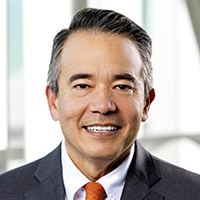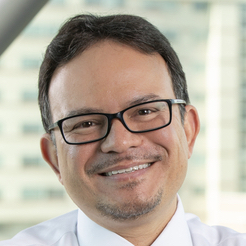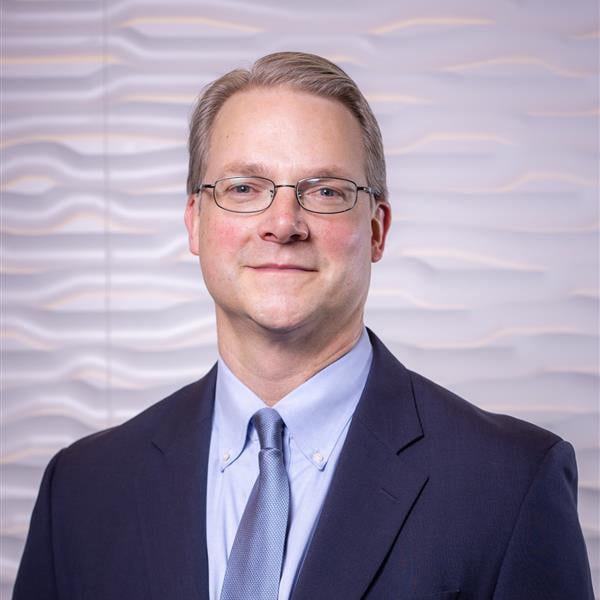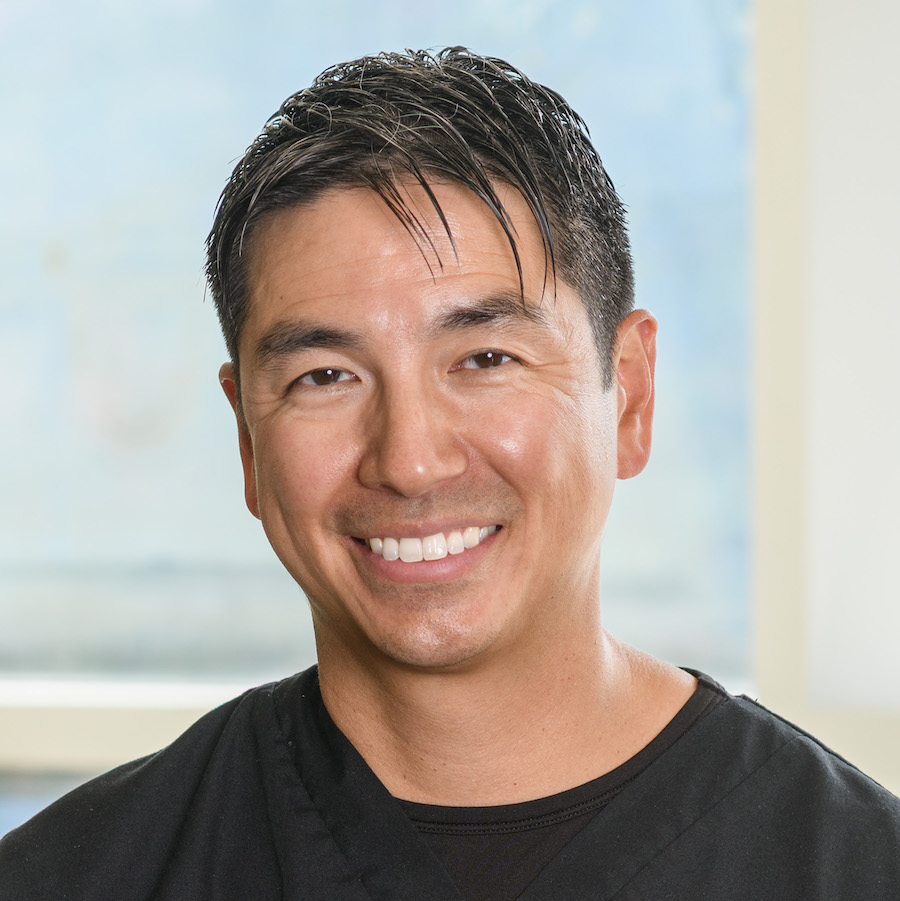A dozen Colorado state senators and representatives gathered on February 6 for a briefing by leaders of the University of Colorado Cancer Center, who gave the lawmakers an overview of the threat posed by cancer, the center’s successes, and the importance of clinical trials in cancer treatment.
CU Anschutz Chancellor Donald Elliman, Jr., greeted the legislative officials as they sat down to dinner with CU Cancer Center faculty at the CU Anschutz Medical Campus. “The CU Cancer Center has been the hub of cancer research and care in this state and this region for nearly four decades,” he told them. “Our goal is to provide not only world-class care as it exists today, but also to take a major role in redefining, and in some cases revolutionizing, what that care could look like into the future.”
CU Cancer Center Director Richard Schulick, MD, MBA, got personal in his opening remarks.
“Both of my parents had cancer, and I hate cancer,” he told lawmakers. “My father was diagnosed with metastatic colorectal cancer when I was a teenager and subsequently died. My mother, shortly after that, was diagnosed with breast cancer and her experience was totally different. She was cured and luckily lived many, many decades after that.”
Schulick asked everyone in the audience to raise their hands if they had a friend, relative, or themselves diagnosed with cancer. Everyone raised their hands.
Key takeaways
The evening’s overall message, Schulick said in a separate interview, is that “we’re all in this together. Stamping out cancer requires scientists, clinicians, nurses, administrators, and, most importantly, it requires support from the public and from government.”
Schulick hoped legislators would take away several key points from the event. “No. 1, cancer is common and all too deadly. No. 2, the value of our NCI-designated comprehensive cancer center and what goes on here. No. 3, our main strategies against cancer, which are prevention, early detection, and good therapies – traditional therapies like chemotherapy, surgery, and radiation, and the new kid on the block, immunotherapy.
“And No. 4, you can have all those things, but if you don’t have a health care system that puts the right patient in contact with the right series of treatments, you're not really curing as many people as you can cure.”
Schulick said he also wanted to convince lawmakers “that we're actually making progress. Age-adjusted cancer death rates have fallen by almost a third over the last 30 years or so. And I think President Biden's Cancer Moonshot plan of decreasing the mortality of cancer by 50% in the next 25 years is very achievable, as long as we keep going and support NCI-designated cancer centers.”

1 CU Cancer Center Director Richard Schulick, MD, MBA, presents cancer statistics, including positive numbers on the cancer death rate, to attendees at a cancer center gathering with Colorado state legislators on Feb. 6, 2024. Photo: Devon Balent / CU Cancer Center.
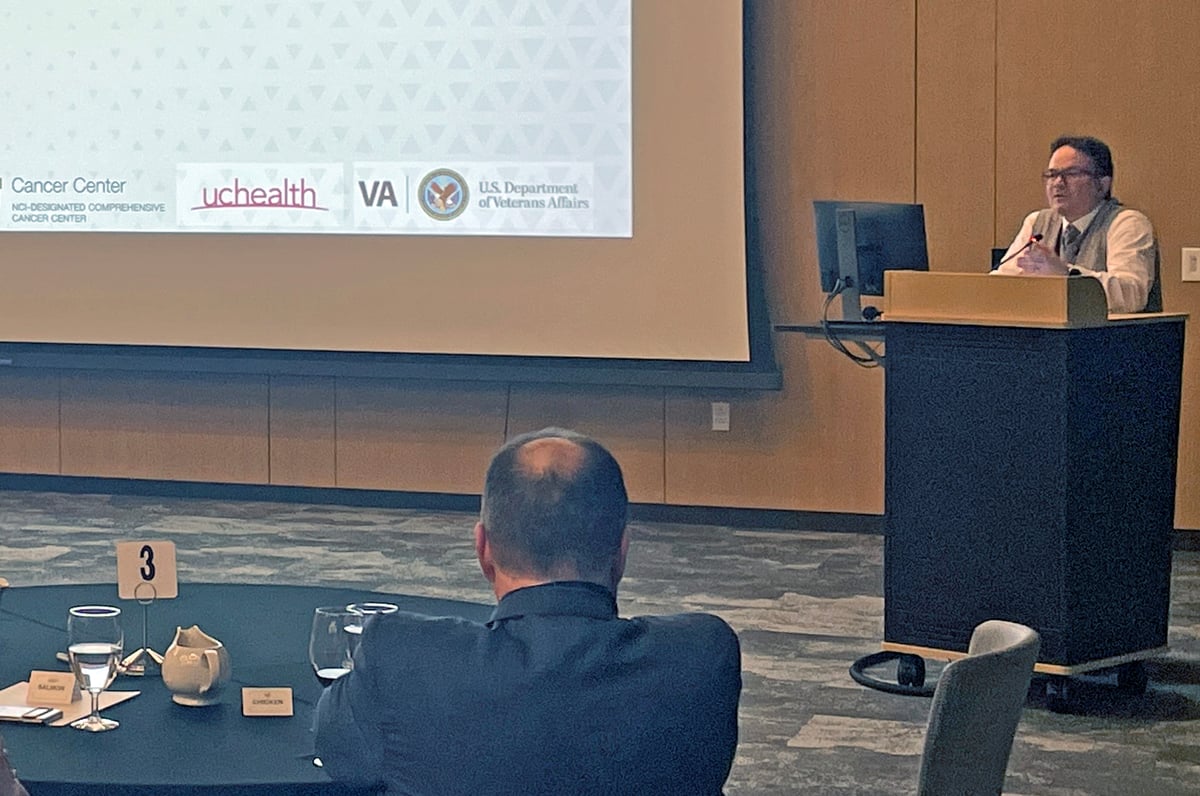






Successes and benefits
Schulick told lawmakers that five-year survival rates for CU Cancer Center patients with several key cancer diagnoses exceed those of other institutions in Colorado and average national rates. He also emphasized that the CU Cancer Center’s catchment area for patients is the entire state of Colorado, and that they come from every county in the state. “People can enter our health care systems at various places away from Denver, and they have access to clinical trials that we are leading from here,” he said.
In other presentations, Eduardo Davila, PhD, the CU Cancer Center’s associate director of its Cancer Research Training and Education Coordination (CRTEC) office, covered the center’s work in “fostering the careers of the next generation of researchers, medical oncologists, scientists, and nurses, and it really begins at childhood.” He talked of engagement efforts at the middle and high school levels as well as other Colorado colleges.
Wells Messersmith, MD, the CU Cancer Center’s associate director of clinical services, offered an overview of cancer rates and treatment, emphasizing the cancer center’s multidisciplinary approach to care as pioneered by Schulick, as well as patients’ access to a range of treatments, top cancer experts, high-quality care close to home, and supportive services like genetic counseling.
Clinical trials ‘represent hope’
Christopher Lieu, MD, associate director of clinical research for the CU Cancer Center, walked the legislators through the mechanics of the center’s clinical trials and their key role in finding better cancer treatments. He noted there are more than 250 cancer clinical trials underway involving more than 5,000 patients, and more than 200 full-time employees involved in running those trials at the CU Cancer Center.
Clinical trials “represent hope,” Lieu said. “They represent the product of all this research. Clinical trials are where the rubber meets the road, where we’re actually able to impact peoples’ lives.”
He talked of a patient diagnosed with Stage IV metastatic liver cancer. Treatment of the woman at another institution had failed, and the cancer had grown into an “unbelievably large abdominal mass” that was causing her intense pain. She came to the CU Cancer Center, where she was offered a clinical trial of two IV drugs “designed to teach the immune system to be able to recognize the cancer,” Lieu said.
The result: “She went from having a disease that gave her a couple of weeks to live, and right now she has no evidence of cancer. And this is all due to immunotherapy.”
Lawmakers impressed
Legislators on hand for the event included Sen. Rhonda Fields, an Aurora Democrat whose district includes the CU Anschutz Medical Campus and who chairs the Senate Health & Human Services Committee. She spoke of a close acquaintance with a cancer diagnosis who “loved the treatment” they received from the CU Cancer Center team.
Also attending was Rep. Rose Pugliese, a Colorado Springs Republican who is the newly chosen House Minority Leader. She said what she heard about clinical trials “is really fascinating to me as well as learning more about the needs around research. My father had cancer twice, and, thank God, survived, and I’ve done a lot of work around childhood cancer research, so I think raising awareness for those issues and supporting clinical trials is incredibly important.”
Sen. Cleave Simpson, an Alamosa Republican who represents much of southwestern Colorado, expressed “deep appreciation for all the effort and good work that’s happening” at the CU Cancer Center and talked about how impressed he was by the campus.
“The conversations tonight and the intentional effort by CU and the cancer center to engage in outreach to the rural parts of the state are so meaningful and touch me in many different ways,” he said. “You don't get a lot of opportunities to spend time with folks who are actually doing things that impact people's lives.”

